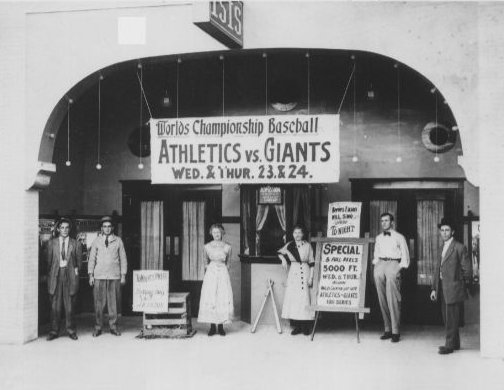Go Giants! Persist!
Hundreds of thousands of Giants fans crowded the streets of downtown San Francisco (http://www.sfgate.com/cgi-bin/object/article?f=/c/a/2010/11/04/MNM51G6DMS.DTL) to welcome their conquering heroes home, many having waited a lifetime for the pleasure. Orange and black confetti poured out office buildings lining the business district.

As broadcasters had reminded us, this was the first championship for the Giants since the franchise had moved to San Francisco from New York in 1958. I’m guessing that very few of the fans lining the streets remember the Giants from those pre-1958 days, nor do they recall that the Giants’ cross-bay rivals the Athletics were once the Philadelphia Athletics. (The outcome of the 1911 matchup was the same as the 1989 earthquake-series.)
This little foray into baseball trivia is a reminder that affiliations come and affiliations go. Even beloved ones, the ones that cause us to paint our faces and wear beards and panda hats.
And that is why our EZID Service Guidelines say “For best results, identifier strings should be opaque (non-meaningful), globally unique, transcription-safe, and reasonably short. Opaque strings tend to age and travel better than identifiers containing widely recognized meaning.”
EZID (http://n2t.net/ezid) is our new service that makes it simple for digital object producers (researchers and others) to obtain and manage long-term identifiers for their digital content. I’ve talked about it a little bit here before, when I mentioned that persistence was not “just” a matter of ensuring that links don’t break.
Of course, this issue of ensuring that links don’t break involves more than a little tinkering. Most particularly, it depends upon a set of services like EZID (and those that underlie EZID), as well as the ongoing maintenance that owners of identifiers provide. But the whole exercise is made easier when the identifiers themselves do not have embedded “freshness dates” in the form of names, brands, or phrases.
What if, in your post World Series enthusiasm, you decided to start all your identifiers with /sfgiants/? Let’s go ten or fifteen years into the future and imagine a despicable owner comes along and takes the team south to San Jose. What then? It’s like a bad divorce. Do you rename all your identifiers? You have hundreds or even thousands. If you don’t, the branding you once thought was so sharp becomes a pointed reminder of things past.
The solution to this problem is simple: avoid mixing love, marketing, meaning, and anything else with your identifiers. Keep them inscrutable. Use metadata to convey the story you want to tell and save.
